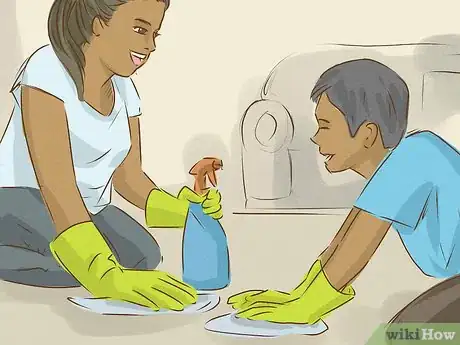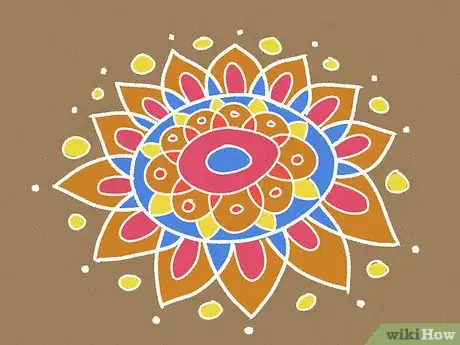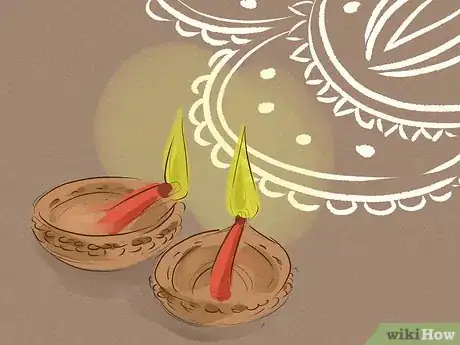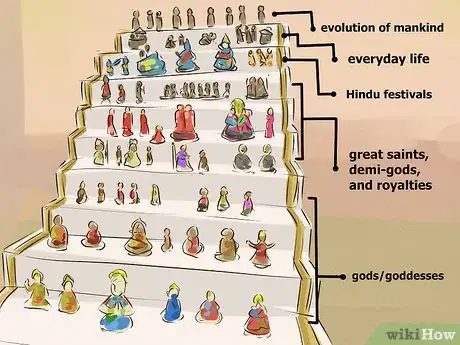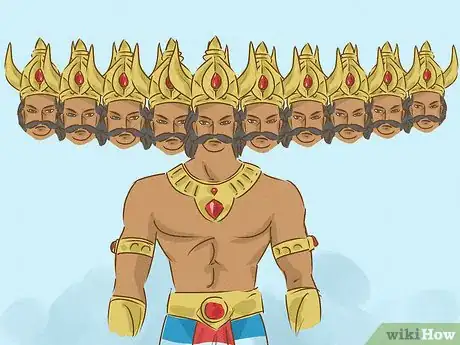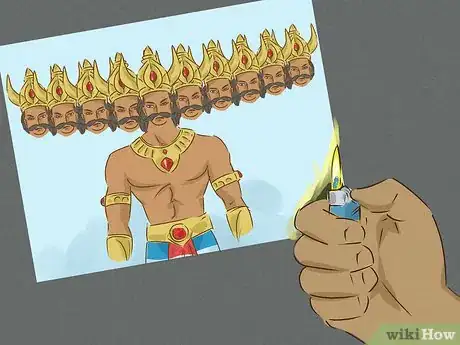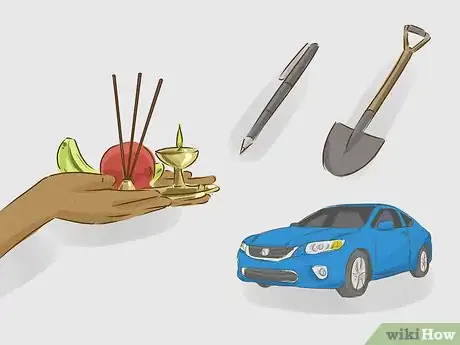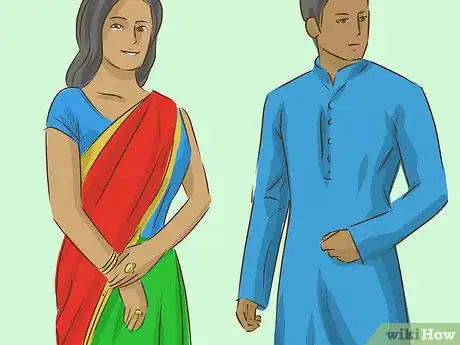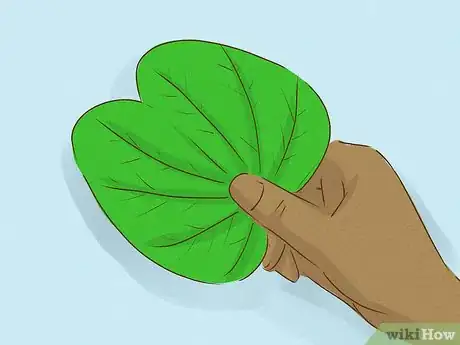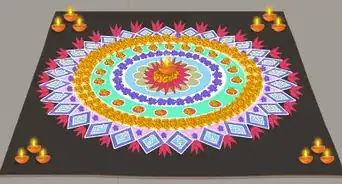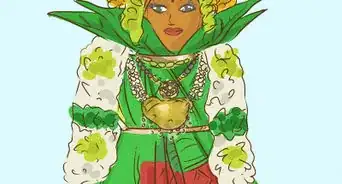This article was co-authored by wikiHow Staff. Our trained team of editors and researchers validate articles for accuracy and comprehensiveness. wikiHow's Content Management Team carefully monitors the work from our editorial staff to ensure that each article is backed by trusted research and meets our high quality standards.
There are 11 references cited in this article, which can be found at the bottom of the page.
This article has been viewed 41,143 times.
Learn more...
Also known as “the day of victory”, Dussehra is the 10th and final day of Navratri, the Hindu festival that worships the goddess Durga. It typically falls in October and kicks off the preparation for Diwali, which begins 20 days later. You can partake in the Dussehra festivities at home by decorating with dolls and vibrant designs, spending time with friends and family, and honoring the religious aspects of the holiday.
Steps
Decorating Your Home
-
1Clean the entire house by vacuuming, mopping, and decluttering. In Indian culture, it’s believed that a tidy home will give off positive energy and be more inviting to the gods and goddesses. During Dussehra, sanitize every surface and window with cleaning spray or wipes.[1]
- If you have a prayer room, pay extra attention to cleaning it. Remove dust and grime from a metal idol of Durga with baking soda sprinkled onto a damp cloth. Buff the baking soda into the metal in small circles.[2]
- Always wear gloves when dealing with harsh cleaning chemicals and keep them away from children or pets.
- Avoid a marathon cleaning session by tidying up for 30 minutes a day the week before the festival.
- Don’t wear shoes inside your house during Dussehra to keep the floors clean.[3]
-
2Draw a rangoli with colorful powder at the entrance to your house. You can use rangoli powder, rice flour, or sand. Sweep the area to get rid of dirt. Then use your thumb and pointer finger to pinch the powder and sprinkle it into a design, whether it’s a drawing of the goddess Durga or a geometric pattern of concentric circles and shapes. It doesn’t matter what you draw, as long as you use bright colors to invite happiness into your home.
- Get creative with your materials! In addition to the powder that you choose, you can use tea leaves, spices like turmeric or cumin, flower petals, or pasta.
- Traditionally, the space where the rangoli is placed is smeared with cow dung prior to drawing.[4]
- Rangoli is Sanskrit for “rows of colors” and is drawn to attract the goddess of wealth and prosperity.[5]
- Rangoli powder can be bought online or in stores like Walmart.
Advertisement -
3Light up your space with diyas and string lights. Diyas are small oil lamps made from clay that are often placed around the border of a rangoli or in a prayer room. You can also drape strands of LED lights inside your home. Not only do lots of lights look pretty and festive, they also indicate the presence of good (light) and the absence of evil (darkness).[6]
- The diya’s oil represents the sins of humans. So when you light the diya, you’re essentially “burning away” the bad.
- You can buy a diya at a specialty store or from an online retailer.
-
4Arrange dolls on a 9-step platform to represent the nights of Navaratri. Every Dussehra, most households set up bommala koluvu, an exhibition of assorted dolls and figurines meant to represent the 3 goddesses (Lakshmi, Parvati, and Saraswati). Begin by covering the platform in a light-colored cloth, then setting the dolls on each step based on their theme.[7]
- Steps 1 to 3: On the top 3 steps, place idols of gods and goddesses.
- Steps 4 to 6: These 3 steps are for great saints, demi-gods, and royalty, like Mysore kings or queens.
- Step 7: Arrange dolls that represent Hindu festivals and celebrations.
- Step 8: Any dolls that depict everyday life like a family eating dinner or a street vendor selling food go on this shelf.
- Step 9: This step is reserved for figurines that show the evolution of mankind.
- You can find a variety of display platforms online or at hobby stores.
Observing Religious Rituals
-
1Make a miniature Ravan out of craft materials like paper and paint. Ravan is the demon king whose defeat is celebrated on Dussehra. You can draw Ravan on paper, paint a picture of him, or craft your own 3D version with whatever materials you want, from toilet paper rolls to popsicle sticks to foam balls.[8]
- Ravan has 10 heads, so drawing one head and then photocopying it can make the craft easier. The 10 heads represent the 10 human emotions (anger, jealousy, ego, lust, greed, pride, attachment, selfishness, injustice, and cruelty).
- You can also purchase an effigy of Ravan online.
-
2Burn your Ravan image to represent the victory of good over evil. In Mysore, they destroy the images of Ravan by setting off fireworks. But to practice the same tradition in your own home, choose a safer option by making a fire in the fireplace or just using a lighter to light the image on fire.
- Dussehra is the day that Lord Rama put an end to Ravan. This is often reenacted as a dramatic performance. If you have kids, give them the story and let them create their own play at home.
- The burning of Ravan is a ritual most commonly observed in Northern India.
-
3Worship tools or weapons that symbolize prosperity. Any object that’s used to create good fortune and wealth is cleaned and worshipped on Dussehra. This can be anything from a car to pens and pencils to a farmer’s shovel.[9] Worship the item by polishing it and saying a prayer over it. Some Indians also perform pujas for their shastra (weapons).
- Weapons have always been honored on this day because they are used to “fight” evil.
- After cleaning their possessions, some Hindus draw a symbol on the items with aipun, rice, and roli.[10]
Honoring Fun Traditions
-
1Wear new clothes to be rewarded with 10 new sets of clothes. Hindus believe that you will receive these new clothes in the year ahead only if you sport unworn ones on the day of Dussehra. The brighter and more vibrant, the better.[11]
- Most jewelry worn during the festival is gold, since gold is considered the god’s metal.
- Women wear colorful sarees while men often wear kurtas and sherwanis. Choose fabrics with intricate borders and embroideries to get in the festive spirit.[12]
-
2Prepare a feast with traditional Indian fare and sweets. Invite your relatives and friends to your home for a meal full of Mysore favorites like masala dosa (Indian crepes), luchis (fried flat breads), or rava idli (steamed semolina cakes). And no meal is complete without sweets, can be given to friends as gifts or even offered to the gods.
- Sweets are so popular on Indian holidays because they’re believed to bring good luck.
- Some of the most common Dussehra sweet treats include besan ladoos, badam halwa, and kheer khas khas.[13] You can also try preparing some home-made peda for that authentic Indian touch.
-
3Exchange apta leaves with friends and family as “gold.” When soldiers returned from war, they would bring treasures to offer the gods and the elders. Now, Hindus continue a similar tradition by passing out leaves from an apta tree instead of actual jewelry.[14]
- These leaves should be gifted from young people to the elderly.
- Apta trees are rare, so you’ll likely have to buy the leaves online.
References
- ↑ https://www.cleanipedia.com/in/housekeeping-budgeting/how-to-prepare-your-house-for-navratri
- ↑ https://www.cleanipedia.com/in/housekeeping-budgeting/how-to-prepare-your-house-for-navratri
- ↑ https://indianexpress.com/article/lifestyle/life-style/happy-navratri-2018-dos-and-donts-during-these-days-5101148/
- ↑ https://www.hindujagruti.org/hinduism/designs-of-rangoli
- ↑ https://www.ibtimes.co.uk/diwali-2015-your-guide-making-traditional-indian-floor-art-rangoli-1526553
- ↑ https://www.deccanchronicle.com/lifestyle/viral-and-trending/191017/significance-of-diyas.html
- ↑ https://www.karnataka.com/festivals/dasara-doll-festival/
- ↑ https://www.youtube.com/watch?v=RJUlEstofAk
- ↑ https://www.hindujagruti.org/hinduism-for-kids/565.html
- ↑ http://www.theholidayspot.com/dasara/dussehra.htm
- ↑ http://www.theholidayspot.com/dasara/dussehra.htm
- ↑ https://www.utsavpedia.com/weddings-festivals/festivals/dusshera/
- ↑ https://www.ndtv.com/food/dussehra-sweets-8-delicious-treats-you-can-make-at-home-to-celebrate-dussehra-2017-1750770
- ↑ https://www.hindujagruti.org/hinduism-for-kids/565.html
